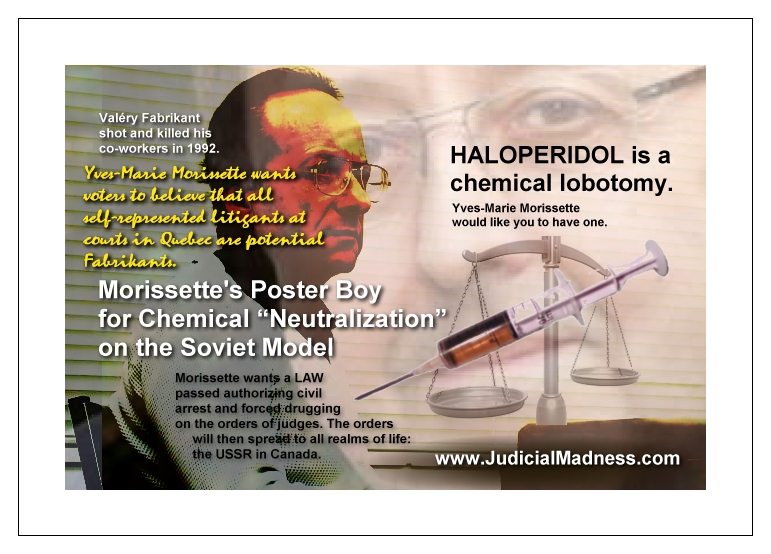Tweedle Yves and Tweedle Évens
 Lawyer Yves-Marie Morissette on his own cannot declare people crazy. Dr. Évens Villeneuve on his own knows no law. But, together, Yves supplies Évens with the alleged “symptoms” (alleged abusive litigation), and Évens obligingly declares Yves's target litigants “crazy”. Even more fun, neither Yves nor Évens has ever met the litigants.
Lawyer Yves-Marie Morissette on his own cannot declare people crazy. Dr. Évens Villeneuve on his own knows no law. But, together, Yves supplies Évens with the alleged “symptoms” (alleged abusive litigation), and Évens obligingly declares Yves's target litigants “crazy”. Even more fun, neither Yves nor Évens has ever met the litigants. Welcome to JudicialMadness
 Judges are declaring lawyerless litigants “crazy” from the bench in Quebec!
[UPDATED 6 May 2016] This is a new website, by a team of one in Montreal, Canada. My objective here is to focus on a subject of grave concern for the average individual who may choose to pursue his or her own interests at court without a lawyer.
In Quebec, for nearly two decades, one man has successfully pushed the legal system into adopting an arbitrary and despotic approach to pro-se litigants, meaning lawyerless
Judges are declaring lawyerless litigants “crazy” from the bench in Quebec!
[UPDATED 6 May 2016] This is a new website, by a team of one in Montreal, Canada. My objective here is to focus on a subject of grave concern for the average individual who may choose to pursue his or her own interests at court without a lawyer.
In Quebec, for nearly two decades, one man has successfully pushed the legal system into adopting an arbitrary and despotic approach to pro-se litigants, meaning lawyerless Quebec press and media are instilling a Soviet mentality of fear and repression in Quebec to silence political and personal freedom
 We are descending into the Soviet system at a rapid clip with the aid of unscrupulous or uncritical press. In an outrageous item in the leftist French-language Le Devoir daily paper of 16 January 2016, citizens who "complain" to their elected representatives are duly "warned". The title of the article reads [translation]:
Warning to professional complainers. “Unreasonable” citizens make life hard for public agencies
"Unreasonable" is apparently Fortier's euphemism for "mentally deranged".
Fortier's
We are descending into the Soviet system at a rapid clip with the aid of unscrupulous or uncritical press. In an outrageous item in the leftist French-language Le Devoir daily paper of 16 January 2016, citizens who "complain" to their elected representatives are duly "warned". The title of the article reads [translation]:
Warning to professional complainers. “Unreasonable” citizens make life hard for public agencies
"Unreasonable" is apparently Fortier's euphemism for "mentally deranged".
Fortier's Extract from the Corrected Version of the Law Reform Committee (Australia) Inquiry into Vexatious Litigants (2008)
 Melbourne - 13 August 2008
Chair: Mr. J. Schefer
Witness
Mr. M. Thomas, Policy Officer, Mental Health Legal Center.
The CHAIR — I welcome Martin Thomas. Thank you very much for coming, and thank you for the material you have provided which we have looked through. There are just a couple of preliminaries before we start. The discussion we are going to have this morning is covered by legislation which affords you parliamentary privilege. Some of the things you might say here
Melbourne - 13 August 2008
Chair: Mr. J. Schefer
Witness
Mr. M. Thomas, Policy Officer, Mental Health Legal Center.
The CHAIR — I welcome Martin Thomas. Thank you very much for coming, and thank you for the material you have provided which we have looked through. There are just a couple of preliminaries before we start. The discussion we are going to have this morning is covered by legislation which affords you parliamentary privilege. Some of the things you might say here In defence of complainants, Dr. R. Pal
 It is interesting that the complaints involved within the study by Lester et al (2004) were not subject to independent legal scrutiny. The reader therefore has no idea of their merits. Anyone who has experienced the difficulties of authorities and courts will realise that bureaucracy and confusion pervade each institution. Anyone who has attended one of our supreme courts will know that the service is slow, correspondence often goes missing, checks are required to ensure that the correct folders and paperwork are presented, and often uncomfortable questions are ignored. These are characteristics of the average day of a normal and rational human being attempting to protect his or her civil liberties. These are practical problems faced by the average person.
It is interesting that the complaints involved within the study by Lester et al (2004) were not subject to independent legal scrutiny. The reader therefore has no idea of their merits. Anyone who has experienced the difficulties of authorities and courts will realise that bureaucracy and confusion pervade each institution. Anyone who has attended one of our supreme courts will know that the service is slow, correspondence often goes missing, checks are required to ensure that the correct folders and paperwork are presented, and often uncomfortable questions are ignored. These are characteristics of the average day of a normal and rational human being attempting to protect his or her civil liberties. These are practical problems faced by the average person. How I Punished a Crooked Lawyer
 There’s a very cute segment (well, I find it funny; it’s given me quite a chuckle) in Maria De Michele’s article now online in English: 2010 – Quebec Bar Annual Conference : Alone Before the Court. Under the general heading of “Les incidents” (“Incidental proceedings”), in connection with self-represented litigants, De Michele warns the law community: Every lawyer knows that the correspondence exchanged between lawyers of record is not to be produced into the court file. This obvious fact is hard to explain to a non-represented litigant.
There’s a very cute segment (well, I find it funny; it’s given me quite a chuckle) in Maria De Michele’s article now online in English: 2010 – Quebec Bar Annual Conference : Alone Before the Court. Under the general heading of “Les incidents” (“Incidental proceedings”), in connection with self-represented litigants, De Michele warns the law community: Every lawyer knows that the correspondence exchanged between lawyers of record is not to be produced into the court file. This obvious fact is hard to explain to a non-represented litigant. Shrinking the Freedom of Thought: How Involuntary Psychiatric Treatment Violates Basic Human Rights
 Even under the legislative frameworks that are typical of most modern democratic societies, psychiatry still treads a particularly fine line between benefiting and harming the exercise of human rights. This is largely because the cultural objectives of psychiatry and human rights are, to some extent, opposed to one another. While the basic principle of human rights is to set limits on the degree of social authority which is allowed to be imposed on individuals, the specialty of psychiatry is to fit 'difficult' individuals into the social fabric. These fundamental differences sometimes threaten to turn psychiatry and human rights into antitheses, even in the most benign political conditions.
Even under the legislative frameworks that are typical of most modern democratic societies, psychiatry still treads a particularly fine line between benefiting and harming the exercise of human rights. This is largely because the cultural objectives of psychiatry and human rights are, to some extent, opposed to one another. While the basic principle of human rights is to set limits on the degree of social authority which is allowed to be imposed on individuals, the specialty of psychiatry is to fit 'difficult' individuals into the social fabric. These fundamental differences sometimes threaten to turn psychiatry and human rights into antitheses, even in the most benign political conditions. Why I learned law and stopped hiring lawyers
 People choose to represent themselves without a lawyer for many reasons. Fees of lawyers are excessive. Confidentiality is dubious. Competency is unpredictable. Respectability, debatable. These angels of the legal system, as they are implied to be in contrast to the so-called lunatics who only howl and moan about them in unwanted ethics complaints, are a very special breed. They are mortals with a license: the right to be deemed to be better than we are. Thanks to the private club (the Bar) which they all must join, they have built-in protection: their own legal mafia will preserve that illusion from a challenge by reality.
People choose to represent themselves without a lawyer for many reasons. Fees of lawyers are excessive. Confidentiality is dubious. Competency is unpredictable. Respectability, debatable. These angels of the legal system, as they are implied to be in contrast to the so-called lunatics who only howl and moan about them in unwanted ethics complaints, are a very special breed. They are mortals with a license: the right to be deemed to be better than we are. Thanks to the private club (the Bar) which they all must join, they have built-in protection: their own legal mafia will preserve that illusion from a challenge by reality. Canada’s Legal Profession: Self-Regulating in the Public Interest?
 Canada’s Legal Profession: Self-Regulating in the Public Interest?
By John Pearson
Published in The Canadian Bar Review, April 2015
(Paragraphing added.)
ABSTRACT
The only justification for state actors to delegate the legislative and judicial functions inherent in the self-regulation of a profession is the public interest.
But this paper argues that Canada’s self-regulating legal profession was born out of professional self-interest. For much of its history, the profession
Canada’s Legal Profession: Self-Regulating in the Public Interest?
By John Pearson
Published in The Canadian Bar Review, April 2015
(Paragraphing added.)
ABSTRACT
The only justification for state actors to delegate the legislative and judicial functions inherent in the self-regulation of a profession is the public interest.
But this paper argues that Canada’s self-regulating legal profession was born out of professional self-interest. For much of its history, the profession Soviet psychiatric drug for dissidents given to U.S. patients
 It’s called Haldol. The generic name is haloperidol. It’s classified as an “anti-psychotic”. You’ll read that Haldol is being phased out in the US, but PM: The Essential Resource for Pharma Marketers reports that Haldol accounts for 5% of anti-psychotic prescriptions handed out between 2010 and 2011. That’s 2.7 million prescriptions for Haldol. In one year, in the US. The major and frequent adverse effects of the drug? Akathisia (the irresistible and painful impulse to keep moving, the inability to sit still), dystonia (severe muscle contractions that twist the body grotesquely), and Parkinsonism. In short, torture. All three of these effects can indicate motor brain damage.
It’s called Haldol. The generic name is haloperidol. It’s classified as an “anti-psychotic”. You’ll read that Haldol is being phased out in the US, but PM: The Essential Resource for Pharma Marketers reports that Haldol accounts for 5% of anti-psychotic prescriptions handed out between 2010 and 2011. That’s 2.7 million prescriptions for Haldol. In one year, in the US. The major and frequent adverse effects of the drug? Akathisia (the irresistible and painful impulse to keep moving, the inability to sit still), dystonia (severe muscle contractions that twist the body grotesquely), and Parkinsonism. In short, torture. All three of these effects can indicate motor brain damage. Echoes of the Past: Punitive Psychiatry by Alexander Podrabinek
 Source: Echoes of the Past: Punitive Psychiatry by Alexander Podrabinek
Nation
Echoes of the Past: Punitive Psychiatry
21 October 2013
Alexander Podrabinek
In October, Russian activist Mikhail Kosenko, one of the accused in the "Bolotnaya Square Case," was sentenced to compulsory psychiatric treatment. This was the first instance of an open use of psychiatry for political purposes in post-Soviet Russia. Author and human rights campaigner Alexander Podrabinek, who was
Source: Echoes of the Past: Punitive Psychiatry by Alexander Podrabinek
Nation
Echoes of the Past: Punitive Psychiatry
21 October 2013
Alexander Podrabinek
In October, Russian activist Mikhail Kosenko, one of the accused in the "Bolotnaya Square Case," was sentenced to compulsory psychiatric treatment. This was the first instance of an open use of psychiatry for political purposes in post-Soviet Russia. Author and human rights campaigner Alexander Podrabinek, who was Soviet Psychiatry Returns
 On Oct. 8, a verdict was announced in the case of Mikhail Kosenko, one of the demonstrators in the May 6, 2012 protest march at Moscow’s Bolotnaya Ploshchad. Kosenko was just one of the 28 people accused in the case, but his verdict was immediately picked up by the press and caused mass protests outside the courtroom. The crowd chanted “Misha!” so loudly that Judge Lyudmila Moskalenko could barely be heard in the courtroom.
On Oct. 8, a verdict was announced in the case of Mikhail Kosenko, one of the demonstrators in the May 6, 2012 protest march at Moscow’s Bolotnaya Ploshchad. Kosenko was just one of the 28 people accused in the case, but his verdict was immediately picked up by the press and caused mass protests outside the courtroom. The crowd chanted “Misha!” so loudly that Judge Lyudmila Moskalenko could barely be heard in the courtroom. Soviet Forever by Alexander Podrabinek
 Former Soviet dissident, Alexander Podrabinek, describes the calculated revival of the Soviet Union by the Putin regime. Published on the 10th of April 2013 by the IMR Institute of Modern Russia in its Analysis category, this article confirms with numerous new and crucial details, the assertions by former Soviet dissident Vladimir Bukovsky in his own public Distinguished Lecture of Tuesday, October 13, 2009 for the Cato Institute under the title: “The Power of Memory and Acknowledgement,” namely that Old KGB-ers are Reviving the Soviet System.
Former Soviet dissident, Alexander Podrabinek, describes the calculated revival of the Soviet Union by the Putin regime. Published on the 10th of April 2013 by the IMR Institute of Modern Russia in its Analysis category, this article confirms with numerous new and crucial details, the assertions by former Soviet dissident Vladimir Bukovsky in his own public Distinguished Lecture of Tuesday, October 13, 2009 for the Cato Institute under the title: “The Power of Memory and Acknowledgement,” namely that Old KGB-ers are Reviving the Soviet System. The “Catastrophe” is Returning: Old KGB-ers are Reviving the Soviet System
 What is more depressing is that the country returned to political repressions. We have today, a couple of dozens of political prisoners, again. Which I thought would never happen in my lifetime.
Even more than that, at a certain point, the psychiatric use for repressions was returned again. And that was by far the most depressing news for me. I thought we buried that method of repression forever.
And yet, it did happen again. Several cases. Luckily, we managed to stop it in time, but we cannot guarantee it would not be renewed tomorrow.
What is more depressing is that the country returned to political repressions. We have today, a couple of dozens of political prisoners, again. Which I thought would never happen in my lifetime.
Even more than that, at a certain point, the psychiatric use for repressions was returned again. And that was by far the most depressing news for me. I thought we buried that method of repression forever.
And yet, it did happen again. Several cases. Luckily, we managed to stop it in time, but we cannot guarantee it would not be renewed tomorrow. Abuse of Process
 The Hon. Senator Anne C. Cools tabled a bill in the House of Commons (the text is linked below in both languages) numerous times in the years leading up to 1996, but unfortunately, this draft law died on the order paper. The present author is of the opinion that this bill should be tabled one more time, but amended to include judges and the ministers who conspire with lawyers to manipulate procedure.
The Hon. Senator Anne C. Cools tabled a bill in the House of Commons (the text is linked below in both languages) numerous times in the years leading up to 1996, but unfortunately, this draft law died on the order paper. The present author is of the opinion that this bill should be tabled one more time, but amended to include judges and the ministers who conspire with lawyers to manipulate procedure. Détournement de la justice
 L’hon. Sénateur Anne C. Cools a présenté un projet de loi au Chambre des communes (le texte est branché ci-bas dans les deux langues) et ce à maintes reprises ces dernières années, mais dommagement ce projet de loi est mort au feuilleton. La présente auteure est d’opinion que ce projet de loi doit être présenté encore une fois, mais modifié pour inclure les juges et les ministres qui s’entendent avec les avocats de manigancer la procédure.
L’hon. Sénateur Anne C. Cools a présenté un projet de loi au Chambre des communes (le texte est branché ci-bas dans les deux langues) et ce à maintes reprises ces dernières années, mais dommagement ce projet de loi est mort au feuilleton. La présente auteure est d’opinion que ce projet de loi doit être présenté encore une fois, mais modifié pour inclure les juges et les ministres qui s’entendent avec les avocats de manigancer la procédure. In Two Minds about Soviet Psychiatry
 Next week, the World Psychiatric Association will decide whether to let the Soviet Union back in. The Soviet Union resigned in 1983 rather than answer a debate on the political abuse of psychiatry. Already, the battle lines have been drawn between those committed to allowing the Soviets back and those who believe it would be premature. Sceptics want better safeguards before the Soviet Union is made respectable again.
Next week, the World Psychiatric Association will decide whether to let the Soviet Union back in. The Soviet Union resigned in 1983 rather than answer a debate on the political abuse of psychiatry. Already, the battle lines have been drawn between those committed to allowing the Soviets back and those who believe it would be premature. Sceptics want better safeguards before the Soviet Union is made respectable again. Another Betrayal by Psychiatry?
 By I.F. Stone
December 22, 1988, The New York Review of Books
Seventeen years ago I attacked the World Psychiatric Association in these pages in “Betrayal by Psychiatry”1 for refusing to hear complaints from Soviet dissidents, including Andrei Sakharov, about the political abuse of psychiatry in the Soviet Union. The WPA staged a repeat performance a few weeks ago at a regional meeting here in Washington.
The WPA leadership turned down a request from Western and Soviet activists to present
By I.F. Stone
December 22, 1988, The New York Review of Books
Seventeen years ago I attacked the World Psychiatric Association in these pages in “Betrayal by Psychiatry”1 for refusing to hear complaints from Soviet dissidents, including Andrei Sakharov, about the political abuse of psychiatry in the Soviet Union. The WPA staged a repeat performance a few weeks ago at a regional meeting here in Washington.
The WPA leadership turned down a request from Western and Soviet activists to present Soviet Psychiatry: A Message from Moscow by Alexander Podrabinek
 The address that follows is a slightly condensed version of remarks recently made by Alexander Podrabinek on videotape in Moscow. Their intended audience is the world psychiatric community and all doctors and laypeople who are concerned about the perversion of psychiatry for political purposes. The tape was shown on October 14, 1988, at a symposium of the International Association on the Political Use of Psychiatry held in Washington, DC, during, but separately from, a conference of the World Psychiatric Association. The WPA refused to allow the symposium to be part of its program.
The address that follows is a slightly condensed version of remarks recently made by Alexander Podrabinek on videotape in Moscow. Their intended audience is the world psychiatric community and all doctors and laypeople who are concerned about the perversion of psychiatry for political purposes. The tape was shown on October 14, 1988, at a symposium of the International Association on the Political Use of Psychiatry held in Washington, DC, during, but separately from, a conference of the World Psychiatric Association. The WPA refused to allow the symposium to be part of its program.
Reports of Psychiatry Abuse
Counter Talk of a Soviet Shift
 A political dissident recently released from a Soviet psychiatric hospital said today that the habitual use of punitive psychiatric treatment in the Soviet Union remained unchanged despite recent criticisms of such practices in the Soviet press. “There are no changes,” said the dissident, Vladimir Titov. “On the contrary, it’s getting nastier.” Mr. Titov was released Oct. 9 from the special psychiatric hospital in the Russian city of Oryel. Mr. Titov said his most vivid recollections were of two strong psychotropic drugs that caused fever, pain, slurred speech and left him unable to lie, sit or stand comfortably. He also spoke movingly of dissidents still inside, while other human rights advocates at the news conference played a tape of another patient, Sirvard Avakian, an Armenian dissident, asking in a trembling voice for Western help in releasing her from what she described as the abuse of her doctors.
A political dissident recently released from a Soviet psychiatric hospital said today that the habitual use of punitive psychiatric treatment in the Soviet Union remained unchanged despite recent criticisms of such practices in the Soviet press. “There are no changes,” said the dissident, Vladimir Titov. “On the contrary, it’s getting nastier.” Mr. Titov was released Oct. 9 from the special psychiatric hospital in the Russian city of Oryel. Mr. Titov said his most vivid recollections were of two strong psychotropic drugs that caused fever, pain, slurred speech and left him unable to lie, sit or stand comfortably. He also spoke movingly of dissidents still inside, while other human rights advocates at the news conference played a tape of another patient, Sirvard Avakian, an Armenian dissident, asking in a trembling voice for Western help in releasing her from what she described as the abuse of her doctors. The Case of Dr. Koryagin
 Fears are mounting that the psychiatrist Anatoly Koryagin is near to death in the notorious jail of Chistopol in central Russia. Letters that have reached the West from his wife and a friend indicate that he is so weak that unless he is given expert medical care he could die at any time. Dr. Koryagin has been in prison for the last four years for actively opposing the political abuse of psychiatry. The abuse takes the form of labeling dissidents as mad and forcibly treating them with drugs in mental hospitals.
Fears are mounting that the psychiatrist Anatoly Koryagin is near to death in the notorious jail of Chistopol in central Russia. Letters that have reached the West from his wife and a friend indicate that he is so weak that unless he is given expert medical care he could die at any time. Dr. Koryagin has been in prison for the last four years for actively opposing the political abuse of psychiatry. The abuse takes the form of labeling dissidents as mad and forcibly treating them with drugs in mental hospitals. The Attack on Anatoly Koryagin
 The Attack on Anatoly Koryagin
Peter B. Reddaway
March 3, 1983 Issue
A detailed account of the “physical torture” of Soviet political prisoners “through starvation, cold, and deprivation of sleep” has just been smuggled to the West from a forced-labor camp in the Urals. Its author is the well-known Russian psychiatrist Dr. Anatoly Koryagin. In 1981 Dr. Koryagin was given a twelve-year sentence for documenting the Soviet practice of interning dissenters in mental hospitals and then “curing”
The Attack on Anatoly Koryagin
Peter B. Reddaway
March 3, 1983 Issue
A detailed account of the “physical torture” of Soviet political prisoners “through starvation, cold, and deprivation of sleep” has just been smuggled to the West from a forced-labor camp in the Urals. Its author is the well-known Russian psychiatrist Dr. Anatoly Koryagin. In 1981 Dr. Koryagin was given a twelve-year sentence for documenting the Soviet practice of interning dissenters in mental hospitals and then “curing” An Appeal to Psychiatrists
 The New York Review of Books
March 18, 1982
Peter B. Reddaway
A defiant appeal to world psychiatrists has recently been smuggled to the West from a Russian labor camp in the Urals. The author, Dr. Anatoly Koryagin, is a Soviet psychiatrist who was given a twelve-year sentence last June for opposing the use of political psychiatry to lock up and torture dissidents. His analysis of the practice was published in April in Western medical journals. Now he calls for an international campaign.
Doctors
The New York Review of Books
March 18, 1982
Peter B. Reddaway
A defiant appeal to world psychiatrists has recently been smuggled to the West from a Russian labor camp in the Urals. The author, Dr. Anatoly Koryagin, is a Soviet psychiatrist who was given a twelve-year sentence last June for opposing the use of political psychiatry to lock up and torture dissidents. His analysis of the practice was published in April in Western medical journals. Now he calls for an international campaign.
Doctors 



